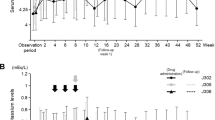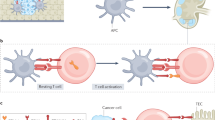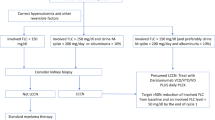Abstract
Two adult leukemia patients underwent allogeneic bone marrow transplantation and received cyclosporine (CsA) as part of their immunosuppressive therapy. Despite adequate kidney function, both patients developed hyperkalemia. Cyclosporine was the only pharmaceutical agent to which this electrolyte abnormality could be attributed. Although the mechanism of the hyperkalemia is unclear, it seems to be related to an aldosterone-resistant state. Cyclosporine-induced hyperkalemia is a relatively common occurrence; however, there is only a single ‘case report’ addressing this phenomenon in bone marrow transplantation patients. We propose both mechanisms and methods of managing CsA-associated hyperkalemia in allogeneic transplantation patients.
This is a preview of subscription content, access via your institution
Access options
Subscribe to this journal
Receive 12 print issues and online access
$259.00 per year
only $21.58 per issue
Buy this article
- Purchase on Springer Link
- Instant access to full article PDF
Prices may be subject to local taxes which are calculated during checkout
Similar content being viewed by others
Author information
Authors and Affiliations
Rights and permissions
About this article
Cite this article
Fleming, D., Ouseph, R. & Herrington, J. Hyperkalemia associated with cyclosporine (CsA) use in bone marrow transplantation. Bone Marrow Transplant 19, 289–291 (1997). https://doi.org/10.1038/sj.bmt.1700652
Received:
Accepted:
Issue Date:
DOI: https://doi.org/10.1038/sj.bmt.1700652
Keywords
This article is cited by
-
Severe metabolic abnormalities after allogeneic hematopoietic cell transplantation
Bone Marrow Transplantation (2005)



